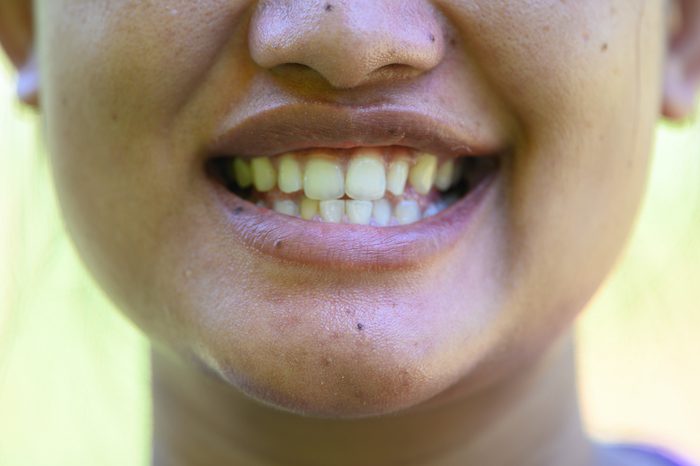An unbalanced bite happens when your teeth don’t line up properly when your mouth is closed. Even if it doesn’t seem like a big deal, having an uneven bite can cause major problems for your teeth and mouth. A balanced bite is important for a healthy and properly working smile. Fixing an unbalanced bite helps your mouth function the way it should.

The Impact of an Unbalanced Bite
Your mouth is designed so that all teeth share the pressure when biting down or chewing on something. The teeth work together to distribute the pressure evenly throughout the mouth.
In an unbalanced bite, certain teeth take on more pressure than others. Those teeth wear down faster than the other teeth in your mouth. They’re also more likely to chip or break because they take on more than their share.
An uneven bite is one of the biggest contributors to TMJ disorders. When the teeth don’t line up properly, there’s uneven pressure on the jaw joint and it doesn’t track the way it should. The muscles that help control the jaw become strained, and you may experience side effects. These include pain and pressure throughout your jaw and face, clicking and popping of the jaw, and difficulties opening and closing your mouth.
An unbalanced bite can actually increase your likelihood of gum issues too. The pressure on your gums is uneven, and they may swell or recede in different areas. These things make the gums more susceptible to damage or developing gum disease and other gum problems.
Treating an Unbalanced Bite
The obvious fix for an unbalanced bite is to put everything back in balance, but how is that done? It starts at your Lexington, KY, dental office. Dr. Morgan Chambers will evaluate your bite problems and jaw health to determine causes and possible treatment options. She may also order x-rays and scans to see what is going on under the surface. From there, the treatment plan depends on the scale of the misalignment and the cause.
Reconstruction
Tooth damage or loss can lead to bite misalignment. The most practical way to fix the problem is to restore your smile. How your dentist reconstructs your teeth depends on the extent of the loss.
Reconstructive treatments include:
- Dental implants replace missing teeth. With an implant, the dentist embeds a post in the jaw that holds a prosthetic tooth.
- Porcelain inlays or onlays can fill damaged areas on the tooth. Just filling cavities or fixing fractures may be enough to restore balance to the bite.
- Dental bridges fill in the gaps. Bridges fill spaces with artificial teeth. Combined with dental implants, a bridge can be a cost-effective option to repair a broken smile.
- Partial dentures are another solution for closing gaps in teeth. The dentist will make an appliance with artificial teeth to synchronize with your bite, so you not only restore your smile but also fix a bad alignment.
Reshaping Teeth
Sometimes an uneven bite comes from just one or two teeth that don’t line up quite right. In these cases, dentists can often fix the problem by carefully reshaping the problem teeth. This process, called dental bonding, is like giving your teeth a mini-makeover so they fit together perfectly.
During the procedure, your dentist will gently remove tiny amounts of enamel to adjust the tooth’s shape, length, or position. They might add tooth-colored composite material in some spots to build up areas that need more support. By the end, your teeth will come together comfortably when you bite down, and your smile will look more even.
This quick fix offers several benefits:
- It’s usually completed in just one visit
- The changes look completely natural
- It can prevent future wear and tear on your teeth
- You’ll notice improved comfort when chewing
While bonding works great for minor adjustments, more complex bite problems might need other treatments like braces. Your dentist can examine your teeth and recommend the best solution for your specific situation. With proper care, these subtle changes can give you a healthier bite that lasts for years.
Orthodontic treatment
Orthodontic treatments like Invisalign use a series of aligners to straighten teeth. Misalignment is a common cause of a bad bite. Shifting teeth into new positions will balance the alignment, making the bite more natural.
Invisalign offers the added benefit of using removable aligners. Patients take them out when they eat and brush, so there are fewer secondary dental problems because of poor oral hygiene. Invisalign treatment time is about one year.
Do you think you have an unbalanced bite? Call our office or schedule an appointment online for an examination.
